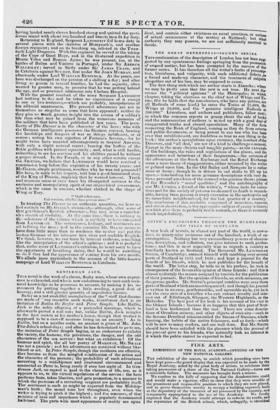THE GREAT METROPOLIS—SECOND SERIES.
THIS continuation of the description of London has not been sug. gested by any spontaneous feelings springing from the possession of unused matter, but has been prompted by the success of the former series. It has therefore all the writer's faults of presurap. tion, literalness, and vulgarity, with such additional defects as a forced and made-up character, and the treatment of subjeers altogether out of his line, may be supposed to cause.
The first thing with which our author starts is Almacks; wbere we may be pretty sure that the new is not true. He next dis. cusses the " political opinions" of the Metropolis; in whits chapter, taking the elections as the chief test of Whigs and Ts. ries, (for he holds that the non-electors, who have any politics, are all Radicals of some kind,) he rates the Tories at 25,000, the Whigs at 20,000, and the " genuine intelligent Radicals at 300,000." Literature, and authors and publishers, follow next; in which the common reports or gossip about the sale of books and the remuneration of authors is mixed up with a good deal of exaggerated truths and absurd speculation. Many of the facts respecting the Bank of England, coming as they do from returns and public documents, or being patent to any one who has been over that establishment, are doubtless as true as any thing in the batik: the author's speculations upon currency, the conduct of the Directors, and "all that," are not of a kind to challenge comment. Except in the more obvious and tangible points,—as the externals of the buildings, the rules and regulations of the places, and the
appearance and behaviour of their frequenters,—the accounts of the adventures at the Stock Exchange and the Royal Exchange seem a mere tissue of exaggerations, either invented by the writer or palmed upon him. In the Old Bailey and Newgate Ile is rather more at home ; though he is driven to sad shifts to fill up his spaee,—interlarding his more germane descriptions with very du-
blobs personal anecdotes of the counsel who practise there; praises of the Recorder's " moral qualities ;" and the autobiography of one Mr. CURTIS, a friend of the writer's, " whose taste for execu- tions and for the society of persons coudemned to death is remark- able, having been present at every execution in the metropolis and its immediate neighbourhood, for the last quarter of a century." The conclusion of this readable compound of invention, rumour, and street observation, is the appropriate subject of penny-a-liners; in which also there is probably muck untruth, as there is certainly muck improbability.


























 Previous page
Previous page